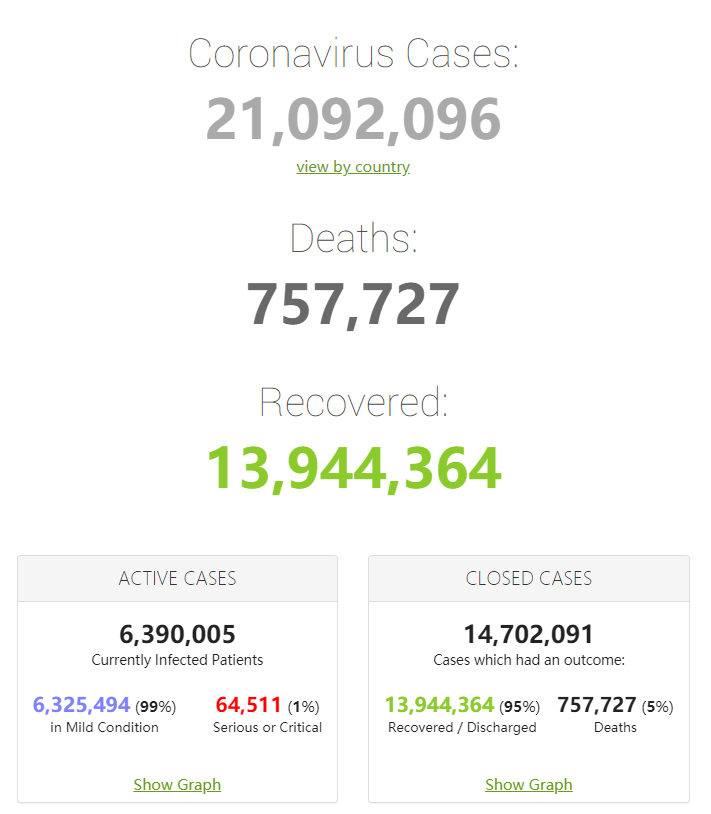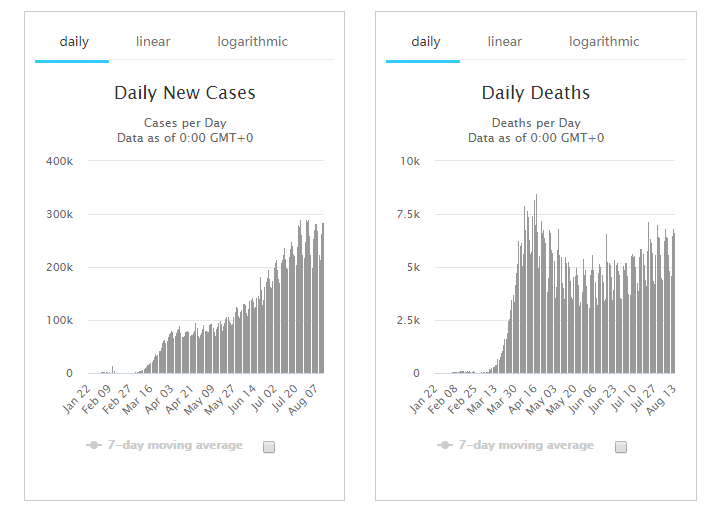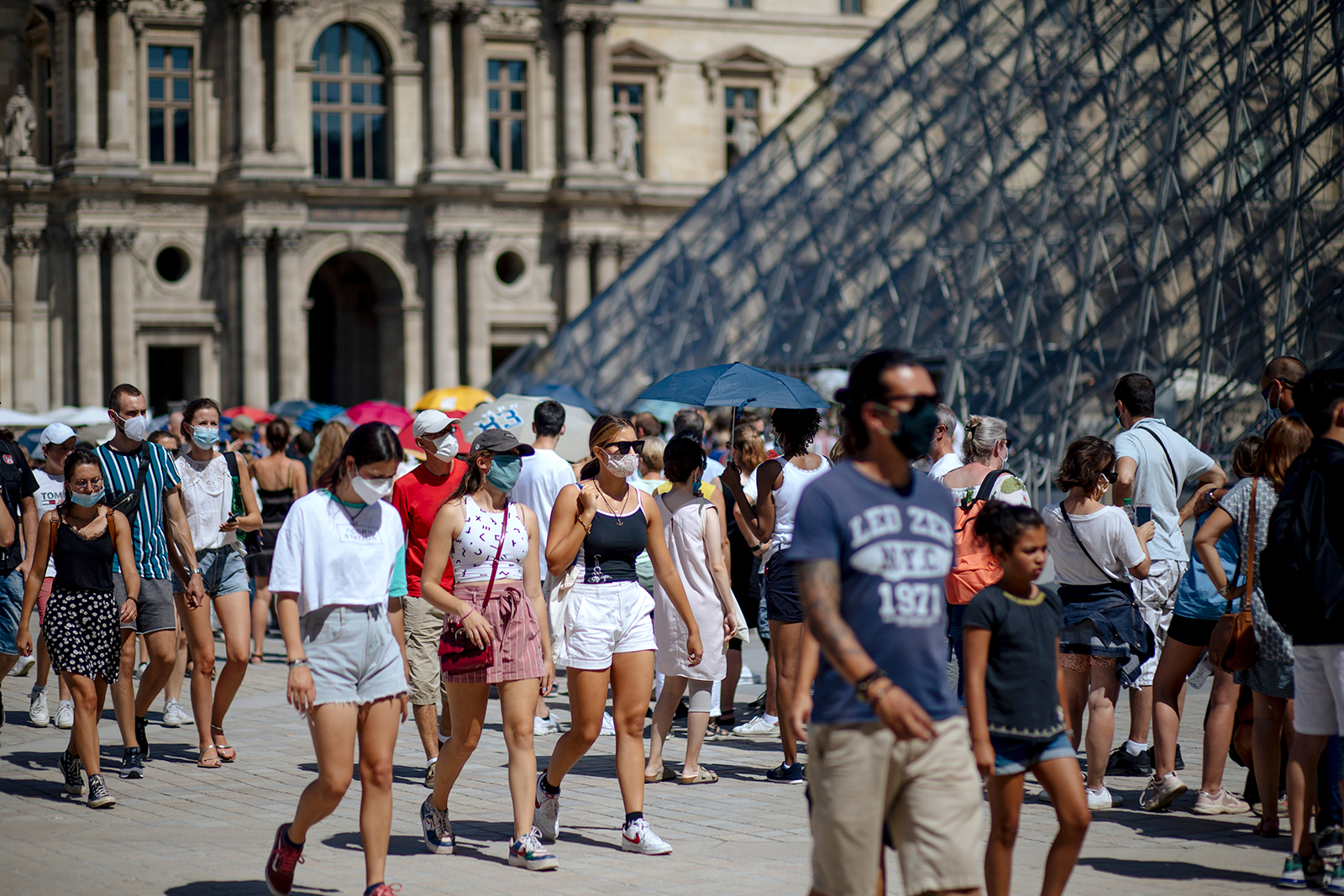
 i_need_contribute
i_need_contribute



|
# |
Country, |
Total |
New |
Total |
|
|
World |
21,057,788 |
+284,195 |
756,719 |
|
1 |
5,415,666 |
+55,364 |
170,415 |
|
|
2 |
3,229,621 |
+59,147 |
105,564 |
|
|
3 |
2,459,613 |
+64,142 |
48,144 |
|
|
4 |
907,758 |
+5,057 |
15,384 |
|
|
5 |
572,865 |
+3,946 |
11,270 |
|
|
6 |
507,996 |
+9,441 |
25,648 |
|
|
7 |
498,380 |
+5,858 |
54,666 |
|
|
8 |
433,805 |
+11,286 |
14,145 |
|
|
9 |
380,034 |
+1,866 |
10,299 |
|
|
10 |
355,856 |
+2,935 |
28,605 |
|
|
11 |
336,324 |
+2,625 |
19,162 |
|
|
12 |
313,798 |
|
41,347 |
|
|
13 |
294,519 |
+1,482 |
3,303 |
|
|
14 |
286,674 |
+753 |
6,139 |
|
|
15 |
276,072 |
+7,498 |
5,362 |
|
|
16 |
269,115 |
+2,617 |
3,557 |
|
|
17 |
252,235 |
+522 |
35,231 |
|
|
18 |
245,635 |
+1,243 |
5,912 |
|
|
19 |
222,269 |
+1,419 |
9,281 |
|
|
20 |
209,365 |
+2,669 |
30,388 |
|
|
21 |
164,277 |
+3,841 |
5,641 |
|
|
22 |
147,526 |
+4,002 |
2,426 |
|
|
23 |
132,816 |
+2,098 |
5,968 |
|
|
24 |
121,234 |
+390 |
9,015 |
|
|
25 |
114,281 |
+343 |
190 |
|
|
26 |
101,372 |
+517 |
1,269 |
|
|
27 |
98,343 |
+1,233 |
6,010 |
|
|
28 |
96,108 |
+145 |
5,107 |
|
|
29 |
95,071 |
+1,743 |
3,827 |
|
|
30 |
89,822 |
+1,671 |
651 |
|
|
31 |
86,140 |
+1,592 |
1,992 |
|
|
32 |
84,756 |
+19 |
4,634 |
|
|
33 |
83,852 |
|
5,776 |
|
|
34 |
83,134 |
+910 |
1,393 |
|
|
35 |
82,531 |
+232 |
551 |
|
|
36 |
78,446 |
+1,069 |
1,722 |
|
|
37 |
75,647 |
+639 |
9,900 |
|
|
38 |
74,486 |
+701 |
489 |
|
|
39 |
69,203 |
+101 |
599 |
|
|
40 |
66,631 |
+1,454 |
2,860 |
|
|
41 |
63,489 |
+277 |
358 |
|
|
42 |
61,204 |
+577 |
6,165 |
|
|
43 |
60,284 |
+1,195 |
2,296 |
|
|
44 |
55,497 |
+102 |
27 |
|
|
45 |
54,487 |
+811 |
1,844 |
|
|
46 |
53,548 |
+325 |
1,770 |
|
|
47 |
51,147 |
+937 |
1,063 |
|
|
48 |
48,657 |
+254 |
1,533 |
|
|
49 |
48,116 |
+373 |
966 |
|
|
50 |
45,726 |
+462 |
167 |
|
|
51 |
41,725 |
+153 |
223 |
|
|
52 |
41,069 |
+310 |
1,487 |
|
|
53 |
41,023 |
+229 |
809 |
|
|
54 |
37,935 |
+1,241 |
584 |
|
|
55 |
37,424 |
+79 |
1,363 |
|
|
56 |
37,403 |
+234 |
1,991 |
|
|
57 |
37,187 |
+488 |
1,341 |
|
|
58 |
33,915 |
+91 |
500 |
|
|
59 |
33,323 |
+858 |
216 |
|
|
60 |
30,369 |
+1,281 |
259 |
|
|
61 |
29,087 |
+390 |
878 |
|
|
62 |
28,998 |
+247 |
661 |
|
|
63 |
28,754 |
+650 |
460 |
|
|
64 |
26,929 |
+91 |
1,774 |
|
|
65 |
26,204 |
+1,086 |
479 |
|
|
66 |
26,129 |
+1,072 |
272 |
|
|
67 |
24,957 |
+525 |
95 |
|
|
68 |
22,594 |
+155 |
725 |
|
|
69 |
22,358 |
+231 |
361 |
|
|
70 |
21,993 |
+349 |
584 |
|
|
71 |
19,401 |
+326 |
391 |
|
|
72 |
18,308 |
+45 |
401 |
|
|
73 |
16,889 |
+42 |
107 |
|
|
74 |
15,491 |
+307 |
106 |
|
|
75 |
15,214 |
+144 |
621 |
|
|
76 |
15,184 |
+223 |
458 |
|
|
77 |
14,770 |
+56 |
305 |
|
|
78 |
14,069 |
+176 |
484 |
|
|
79 |
13,522 |
+125 |
162 |
|
|
80 |
12,357 |
+140 |
532 |
Source:https://www.worldometers.info/coronavirus/
BY PETER SULLIVAN The Hill
The United States on Wednesday suffered the highest number of coronavirus deaths since mid-May, making it the deadliest day this summer.
There were 1,503 deaths, according to the Covid Tracking Project.
COVID-19 deaths are lower than their peak in April, when they reached as high as 2,000 per day in the U.S.
But after falling for weeks in the late spring, deaths began increasing in early July amid worsening outbreaks in the South and West.
The persistent death toll in the United States stands in stark contrast to other countries that have more successfully suppressed their outbreaks.
The European Union, whose population exceeds that of the U.S. by more than 100 million, had just 115 deaths on Wednesday, according to statistics compiled by Our World in Data.
There have been more than 166,000 deaths in the United States from the coronavirus since the pandemic began, the most of any country in the world, according to data from Johns Hopkins University.
Deaths are a lagging indicator, meaning it takes time for a patient to develop symptoms and get hospitalized before they die. Some hard-hit states have turned the corner on cases but are still seeing high rates of COVID-19 deaths.
The United States on Wednesday suffered the highest number of coronavirus deaths since mid-May, making it the deadliest day this summer.
There were 1,503 deaths, according to the Covid Tracking Project.
COVID-19 deaths are lower than their peak in April, when they reached as high as 2,000 per day in the U.S.
But after falling for weeks in the late spring, deaths began increasing in early July amid worsening outbreaks in the South and West.
The persistent death toll in the United States stands in stark contrast to other countries that have more successfully suppressed their outbreaks.
The European Union, whose population exceeds that of the U.S. by more than 100 million, had just 115 deaths on Wednesday, according to statistics compiled by Our World in Data.
There have been more than 166,000 deaths in the United States from the coronavirus since the pandemic began, the most of any country in the world, according to data from Johns Hopkins University.
Deaths are a lagging indicator, meaning it takes time for a patient to develop symptoms and get hospitalized before they die. Some hard-hit states have turned the corner on cases but are still seeing high rates of COVID-19 deaths.
Florida, for example, had a record 277 deaths on Tuesday, but has seen new cases start to decline, according to the Covid Tracking Project.
Former Food and Drug Administration Commissioner Scott Gottlieb said Sunday on CBS’s “Face the Nation” that the country could have up to 300,000 deaths by the end of the year.
“We're definitely going to be somewhere between 200,000 and 300,000, and whether we're closer to 200,000 or closer to 300,000 depends on what we do and how this evolves,” he said.
From CNN's Barbara Wojazer in Paris

People walk past the Louvre Museum in Paris, on August 12. Kamil Zihnioglu/AP
The French capital Paris and the southern city of Marseille and its surrounding areas have been classified as "zones of active circulation" of coronavirus, according to a French government decree published today.
The classification allows local authorities to impose further restrictions, including limits on movement and the closure of restaurants, bars or other venues, according to a previous decree which set out conditions to the lifting of lockdown measures.
French Health Minister Olivier Veran announced on Wednesday that Paris and Marseille would "probably" soon be reclassified as zones of active circulation of the virus "given the evolution of the epidemic."
The cities are "particularly at risk" because they are highly populated, with young people who have "an intense social activity," Director of National Health Agency Jérôme Salomon told France Inter radio this morning.
From CNN's Julia Hollingsworth
New Zealand's extended a lockdown in its most populous city demonstrates how fast early successes in the pandemic can change.
The country is battling a fresh community coronavirus outbreak after months without any locally transmitted cases.
There's still a major, unanswered question: How did this outbreak happen?
The remote island nation imposed strict border controls back in March, meaning that, for the most part, only New Zealanders are allowed into the country -- and those who do arrive from abroad need to spend 14 days in state quarantine facilities.
According to the Ministry of Health, 68% of New Zealand's cases are imported or linked to imported cases.
Quarantine facilities: One possible cause of this latest outbreak is that coronavirus somehow got out of New Zealand's state quarantine facilities. That's what Deputy Prime Minister Winston Peters told Australian national broadcaster ABC, saying: "I think there has been a breach in our quarantine system."
There have been breaches in New Zealand before -- in July, a man cut through a fence at a managed isolation facility to visit a liquor store, and another man who later tested positive for coronavirus broke out of a facility and visited a supermarket.
It's possibly a different strain of the virus: So far, authorities haven't found a match between the genome involved in this latest outbreak and any cases in managed isolation facilities. New Zealand's Director General of Health Dr. Ashley Bloomfield said the new cases most closely resemble the genome patterns from the United Kingdom and Australia.
Bloomfield thinks the outbreak could have come in through the isolation facilities rather than being in present for months in New Zealand.
I think there's very good evidence to suggest that it hasn't been lurking in the community," he said.
Ardern said Friday that the strain in the new outbreak is not the same as one that previously existed in New Zealand.
Warehouse samples tested: Authorities are also testing samples from surfaces at Americold, an American temperature-controlled warehouse company where one of the original four to test positive worked. A number of cases have been linked to the company.
But nothing is conclusive at this stage: Ardern said that, for now, authorities did not know how the outbreak happened. "We do not necessarily need to answer that question to deal with this cluster effectively," she said.
From CNN's Eliza Mackintosh, Gianluca Mezzofiore and Katie Polglase
 CNN
CNN
Four years. That’s the fastest a vaccine has ever been developed -- and most take 10 to 15.
But scientists are now racing to do it in under one.
Dozens of research teams around the world are working to develop a vaccine for SARS-CoV-2, the virus that causes Covid-19, using a mix of established techniques and new technologies.
Funding for a vaccine has never been greater, with billions of dollars pouring in from around the world to make a product that could help to control the pandemic -- but the US, China and Europe have invested the most.
Before even the most vulnerable groups can get a shot in the arm from their family doctor, however, a lot of work needs to be done -- and a lot of deals need to be made.
As the coronavirus continues to accelerate unabated, here’s what it will take to bring a vaccine to the masses and how each of the three biggest players are faring in their quest to make it happen as quickly as possible.
From journalist Isaac Yee in Hong Kong
New Zealand’s Prime Minister Jacinda Ardern announced that the current level 3 coronavirus restrictions in Auckland and level 2 restrictions in the rest of the country will be extended for 12 more days.
“In keeping with our precautionary approach and New Zealand’s philosophy of going hard and going early, today Cabinet has agreed to maintain our current settings for an additional 12 days,” Ardern said at a press conference today.
At the end of the extended lockdown, Ardern said they expect to have identified and isolated the cluster so Aukland can return to level 2.
"That means Auckland will remain at level 3 and New Zealand will remain at level 2 -- the rest of the country -- until 11:59 p.m. on Wednesday August 26,” Ardern said.
The Prime Minister said that lifting restrictions now would lead to a “potential explosion in cases” which is the “worst thing we could do for Auckland and the New Zealand economy, adding that “the best economic response is a strong health response."
New cases: The announcement comes after New Zealand reported 12 new locally transmitted cases on Friday. The country has recorded a total of 30 new cases -- with 29 of them locally transmitted and one imported -- since Tuesday, when it broke a 102-day streak of no local infections.
What the restrictions mean: Under level 3 restrictions in Auckland, public venues such as museums, playgrounds and gyms will remain closed, while people are instructed to stay home in their bubble, other than for essential personal movement. Under level 2 restrictions in place in the rest of the country, no more than 100 people can gather at one place and businesses must adhere to social distancing guidelines.
Journalist Rodrigo Pedroso in Sao Paulo and CNN's Jonny Hallam in Atlanta

President of Brazil Jair Bolsonaro speaks during a visit to Sao Paulo Air Base in Sao Paulo, Brazil, on August 12. Alexandre Schneider/Getty Images
Brazil's President Jair Bolsonaro said the country "is in a privileged situation compared to most other countries” when it comes to the pandemic's impact on the economy.
The President made the remarks during his weekly Facebook live webcast on Thursday.
Despite Brazil having the second highest death toll globally, Bolsonaro advocated for the entire country to be reopened and explained how he expects the Brazilian economy to recover “until the end of the year” if it continues to open up.
Bolsonaro has been downplaying the outbreak in Brazil since the start the pandemic, frequently criticizing coronavirus lockdown measures and news coverage of the virus.
Unemployment: The latest official figures on unemployment show that a total of 8.9 million people lost their jobs as the coronavirus pandemic swept through Brazil -- representing the sharpest contraction on record for the country.
Brazil's unemployment rate rose to 13.3% for the quarter ending in June.
Cases continue to rise: On Thursday, Brazil reported at least 60,091 new cases from Covid-19 and 1,262 new fatalities, bringing the confirmed nationwide total to 3,224,876 and 105,463 deaths.
From CNN's Yoonjung Seo in Seoul
South Korea registered 103 new coronavirus cases on Thursday, the South Korean Centers for Disease Control and Prevention (KCDC) said.
It's the first time the country reported more than 100 new daily cases since April 1.
Among the new cases, 85 were locally transmitted and 18 others were imported, Vice Health Minister Kim Ganglip said at a briefing.
Churches and schools: Kim said the health authorities are very concerned about multiple clusters from churches, door-to-door sales companies, markets and schools in Seoul and Gyeonggi province.
Sarang-jeil church in Seoul has 13 cases and the number is expected to rise. Kim said the church has not been fully cooperative with the government’s tracing efforts.
New rules for foreign patients: Starting from August 17, foreign coronavirus patients who violate South Korean anti-virus measures will be responsible for full treatment costs.
South Korea has so far reported 14,873 Covid-19 cases and 305 deaths, according to the KCDC.
From CNN’s Lauren Mascarenhas
America needs to get control of Covid-19 and carefully reopen the country, or the consequences could be devastating, Dr. Anthony Fauci told actor Matthew McConaughey in an interview on Instagram Thursday.
“To think that you can ignore the biologic and get the economy back, it's not gonna happen,” said Fauci, the nation’s leading infectious diseases expert. “It's just not gonna happen. You gotta do both. You gotta get control of the biologic as you carefully, open the country.”
Fauci emphasized the importance of acting in a measured, prudent way. He noted that we have seen the consequences of jumping over the guideposts that have been established for safe reopening.
“It goes beyond the economics,” said Fauci. “If you shut down, even if there was no economic issue, what happens is that psychologically, it could be devastating."
“If you're really shut down, children may not get their vaccinations. People don't go to hospitals when they get chest pain,” he added. “There's a lot of different things that could go wrong, beyond the economy.”
Fauci gave another grim warning.
“In fact, there's projections that if you stay shut down, the number of deaths unrelated to Covid will go up,” he said. “The number of suicides, overdoses, family issues, such as child abuse and things like that, they all go up.”
Fauci said that he believes the country can come together to overcome the virus.
“I'm old enough to have been a baby during World War II, but I remember how the country absolutely pulled together. We pulled together after 9/11. This is equivalent to that,” he said. “We've got to pull together.”
Source:https://edition.cnn.com/world/live-news/coronavirus-pandemic-08-14-20-intl/index.html
Ukraine has reported 1,732 new coronavirus cases, a single-day record, the country’s national council of security and defence said.
Total cases reached 87,872, including 2,011 deaths, according to Reuters.
The number of infections has increased sharply since June as authorities have eased some restrictions, allowing cafes, churches and public transport links to reopen.
Data from the John Hopkins University tracker shows that the number of daily cases in Ukraine have tripled from just over 500 at the end of June.
That’s it from me, Helen Sullivan for today. Thank you for following along – and, as always, for the news tips and other messages. I’ll be on holiday for a week – looking forward to bringing you all the news that’s fit to blog when I return.
My colleague Josh Halliday will be taking you through the next few hours of pandemic news.
In the meantime, below is a summary of the key developments from the last few hours:
· Global coronavirus deaths passed 750,000. The coronavirus pandemic has now killed more than 750,000 people worldwide, according to data from the Johns Hopkins University tracker. Almost half of the deaths reported worldwide were in the four worst hit countries: the United States (166,118), Brazil (104,201), Mexico (54,666) and India (47,033).
· The UK government has quietly removed 1.3m coronavirus tests from its data because of double counting, raising fresh questions about the accuracy of the testing figures.In the government’s daily coronavirus update on Wednesday, it announced it had lowered the figure for “tests made available” by about 10% and discontinued the metric.
· The UK government has confirmed that six countries, including France, will be removed from its travel corridor list, following a surge in Covid-19 cases. Arrivals into the UK from France, the Netherlands, Malta, Monaco, Aruba and Turks & Caicos will have to quarantine for 14 days on their return or face a fine, will come into effect at 4am on Saturday. The UK will be “ruthless” over quarantine, UK PM Boris Johnson said
· France said the UK quarantine move will lead to reciprocal measures. France’s secretary of state for European affairs has responded to said the UK decision to add France to their quarantine list, saying the move would lead to “reciprocal measures” across the Channel. Clement Beaune tweeted: “A British decision which we regret and which will lead to reciprocal measures, all in hoping for a return for normal as soon as possible.”
· France reported a new post-lockdown peak in daily Covid-19 cases. The French health ministry reported 2,669 new coronavirus infections over the past 24 hours, setting a new post-lockdown daily high for the second day in a row and taking the country’s cumulative total of cases to 209,365.
· New Zealand has reported 13 new cases of coronavirus and extended the lockdown in Auckland for 12 days. Two of the cases emerged far from Auckland, the original site of the country’s outbreak.The two cases were linked to the Auckland outbreak and occurred in the Waikato town of Tokoroa, 200km south of New Zealand’s biggest city, bringing the total size of the cluster to 30. One person was being treated in hospital.The development was described as concerning, with fears health services in the more rural area could come under strain.
· A man in his 20s has died of coronavirus in Australia, the country’s youngest victim. He is among 14 people in the southern state of Victoria to have died from coronavirus in the past 24 hours, with the state recording 372 new cases in that time.The deaths take the state’s toll from the virus to 289 and the national toll to 375.
· Peru passed 500,000 coronavirus cases and has the highest fatality rate in Latin America, according to health ministry data on Thursday, as the government struggles to contain a recent surge of infections. There have been 507,996 confirmed cases and 25,648 related deaths, vice health minister Luis Suarez said at a news conference. The Andean country has the highest coronavirus death rate in Latin America at 78.6 per 100,000 people, a Reuters tally shows, surpassing hard-hit regional neighbors Chile and Brazil.
· The WHO on Thursday urged countries to invest billions of dollars in searching for Covid-19 vaccines and treatments – calling it a snip compared to the vast economic cost of the coronavirus crisis. The World Health Organization insisted it was a smarter bet than the trillions of dollars being thrown at handling the consequences of the global pandemic.
· Germany admits delay in thousands of virus test results. The Bavarian premier, Markus Söder, has been forced to apologise over an embarrassing delay to thousands of coronavirus test results, just as Germany is seeing a new surge in virus cases.